or many businesses and creators, finding an appropriate SaaS LMS is the primary task in an aspiration to answer their learning needs. And SasS LMS usually comes with an array of features, provides flexibility, and allows you to build a centralized learning system.
Nothing but benefits, right? Even though it is not a great fit for all, a SaaS LMS can be a very convenient option.
Let’s learn more about its definition, key benefits, and the best LMS SaaS platforms.
What is SaaS LMS?
You must have heard about software-as-a-service, a model that allows users to access a web application located on external servers to get a service on a subscription basis.
In this regard, SaaS LMS is a web app offering diverse learning development and management features that users access via the Internet.
How does it work? A vendor hosts a learning management system on the web. In its turn, a learning or training provider uses a web portal and gets access to all the course creation features without any installations.
They invite and manage learners, monitor their performance, and collaborate. Yet, much depends on the subscription that SaaS LMS vendors provide.
Saas LMS vs On-premise LMS
Simultaneously, SaaS LMS is not the only option for businesses or organizations, especially governmental or strategic ones. There is also an on-premise LMS, the system that providers install on the company servers and devices.
Compared to SaaS LMS, on-premise LMS offers greater control over customization, data distribution, user access, and security. Nonethetless, SasS-based LMSs are far more easy to implement and maintain, requiring almost no technical support or maintenance costs.
SaaS Learning Management Benefits
At this moment, you might have guessed that SaaS LMS solutions are ideal for businesses and fast-growing companies. With them, enterprises can provide corporate training effectively, while academies can offer specific learning programs.
So yes, they are easy to scale, provide a suitable set to manage and develop online courses, and bring certain versatility.
What are the other benefits of a SaaS learning management system?
Cost of Ownership
Let’s continue with cost-effectiveness, a primary LMS SaaS advantage. Compared to on-premise systems, SaaS LMS vendors allow businesses to choose a pricing plan tailored to their specific needs. In turn, it reduces necessary expenses.
Besides, such a LMS platform requires no maintenance, as the SaaS vendor handles updates and technical support. In the end, under SaaS LMS pricing, organizations pay for what they need and leave room for subsequent scaling.
Read more: LMS Pricing
Integration capabilities
Next, it’s hard to ignore the advantages that cloud based LMS integrations can bring. Before all, they allow businesses to connect various tools and systems.
That way, they can enrich the learning experience with diverse content, collaborative tools, and data transfer. On the other hand, with robust API support, organizations can synchronize data across platforms, add to reporting and analysis, and align learning with other operations.
LMS implementation and course development
One more crucial advantage lies in the implementation of online SaaS LMS. Usually, it is straightforward and time-efficient, saving businesses significant resources.
As such solutions are web-based, there is no need for complex installations or IT infrastructure. It means learning businesses can launch their training courses quickly, focusing on training content development rather than technical challenges.
As a result, even if you are switching learning management systems, your employee training programs will start with a minimal delay.
Flexibility
Lastly, flexibility is the key benefit of SaaS LMS platforms due to their focus on accessibility and ease of use for both administrators and learners.
These platforms typically offer intuitive interfaces that facilitate user management and course administration. Simutnesouly, learners benefit from the ability to access courses remotely, anytime, and on any device.
Overall, the versatility, together with integration capabilities, not only supports diverse learning environments but also enhances engagement and makes the process more adaptable to individual needs and schedules.
Best SaaS LMS Systems for 2025
Having these benefits in mind, we’ve created a list of the top SaaS vendors that can add to your business, bringing flexibility, streamlining course management, and offering content diversity.
Here is our list of the top SaaS learning management systems:
- #1. EducateMe: Best SaaS LMS regarding ease of use and management
- #2. Absorb LMS: Decent SaaS LMS with gamification and customization
- #3.LearnWorlds: Comprehensive LMS for self-paced learning
- #4.LearnUpon: Solid LMS with customizable portals
- #5.Docebo LMS: All-in-One SaaS training platform
- #6.TalentLMS: SaaS LMS with flexible course editor
- #7. Skilljar: SaaS LMS software for customer education
- #8. Cypher Learning: LMS for organizations to upskill employees
- #9. Canvas LMS: SaaS LMS for educational organizations
- #10. SanaLabs: Platform with advanced AI capabilities
#1. EducateMe: Best SaaS LMS Regarding Ease of Use and Management
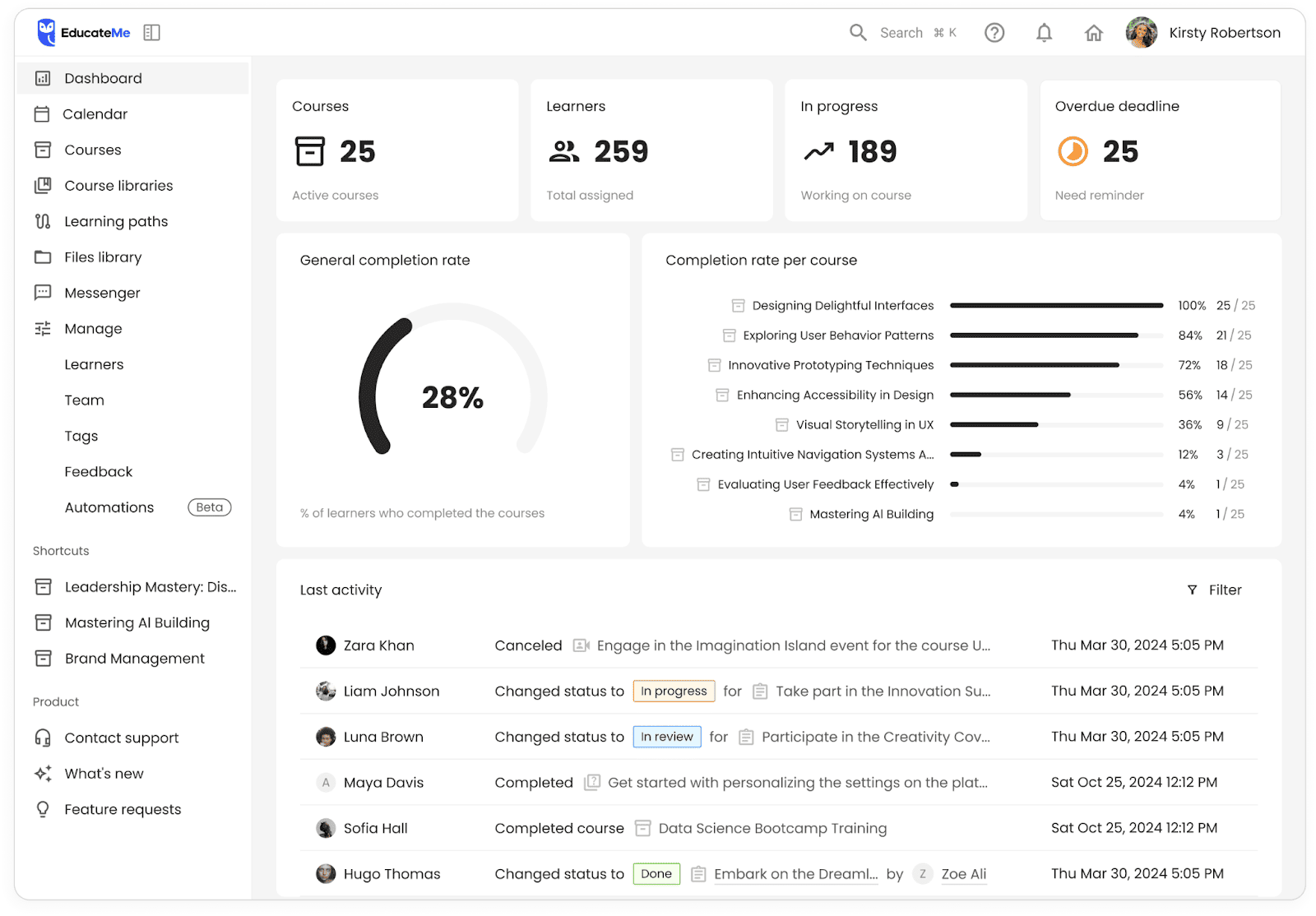
Let’s start with one of the most intuitive options for learning businesses on the market.
EducateMe is the best SaaS LMS concerning ease of use, flexibility, and training management.
It provides an extremely user-friendly design, allows powerful customization and multiple integrations, and offers solid features for engagement and collaboration.
The platform’s flexible course creation, group assignments, and automation are great for collaborative or cohort learning, having space for scaling. Also, this SaaS LMS vendor provides great branding features and solid reporting to track learner progress, completion rates, and learners’ participation.
Key features of this SaaS-based LMS:
- Branding options. With EducateMe, you can customize pages and connect learning to your brand using colors, fonts, logos, or domain integration.
- Training management. Besides, this Saas LMS brings a Kanban dashboard, an intuitive calendar, and group assignments to handle and handle activities.
- Engagement kit. Importantly, the learning management system offers peer review, discussion channels, built-in messenger, and Zoom/Loom integrations for blended learning.
- Integrations. EducateMe seamlessly integrates with such software as Slack, Notion, and Calendly, and offers powerful API support allowing you to create custom solutions.
- Reporting tools. There are advanced analytics, an informative dashboard, and a proper tag system to track data on learners or online courses.
For whom is it a great pick?
Ideal for training providers, corporate actors, and academies needing intuitive LMS for group learning, self-paced programs, onboarding, or scalable courses.
Pros: Very intuitive and highly flexible with extensive customization options; great integrations; strong real-time collaboration tools and management options.
Cons: Lacks a mobile app.
#2. Absorb LMS: Decent SaaS LMS With Gamification and Customization
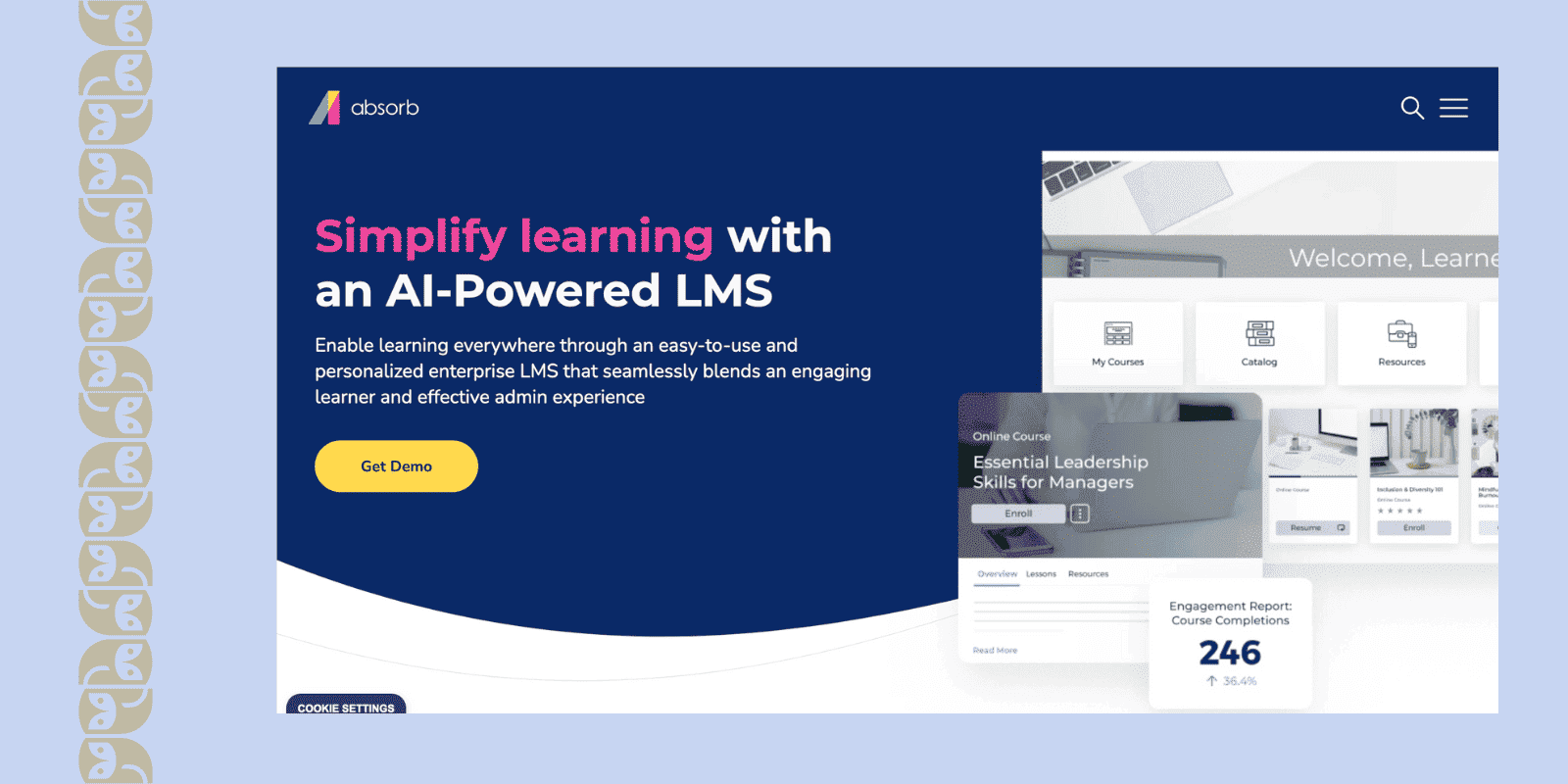
Here is another flexible SaaS learning management system to provide diverse employee training or personalized learning programs.
Absorb LMS is a SaaS-based LMS that excels in course customization, management, and gamification.
Due to the variety of formats, author collaboration, and AI-personalized recommendations, businesses can create tailored learning experiences and build content-rich learning experiences.
Notably, Absorb LMS can enhance learning through observation checklists and gamification options. With these features, businesses have the freedom to create structured, interactive, and engaging programs.
Key Features of this SaaS LMS:
- Gamification. The SaaS LMS provider offers users such gamification tools as badges and leaderboards, while AI-driven recommendations add to personalized learning.
- Integrations. The learning management software seamlessly integrates with various third-party platforms like LinkedIn Learning and SkillSoft, supporting content production, and HRIS platforms.
- Reporting. There is comprehensive training analytics, with the ability to customize the dashboard and reports.
For whom is it a great pick?
Large enterprises with diverse online training needs and a focus on upskilling and continuous learning.
Pros: highly flexible with a wide range of content and management tools. strong AI and gamification features.
Cons: the pricing structure can be unclear and potentially expensive.
Pricing: free trial; pricing available upon request.
Read more: Best Training Management Software
#3. LearnWorlds: Comprehensive LMS For Self-Paced Learning
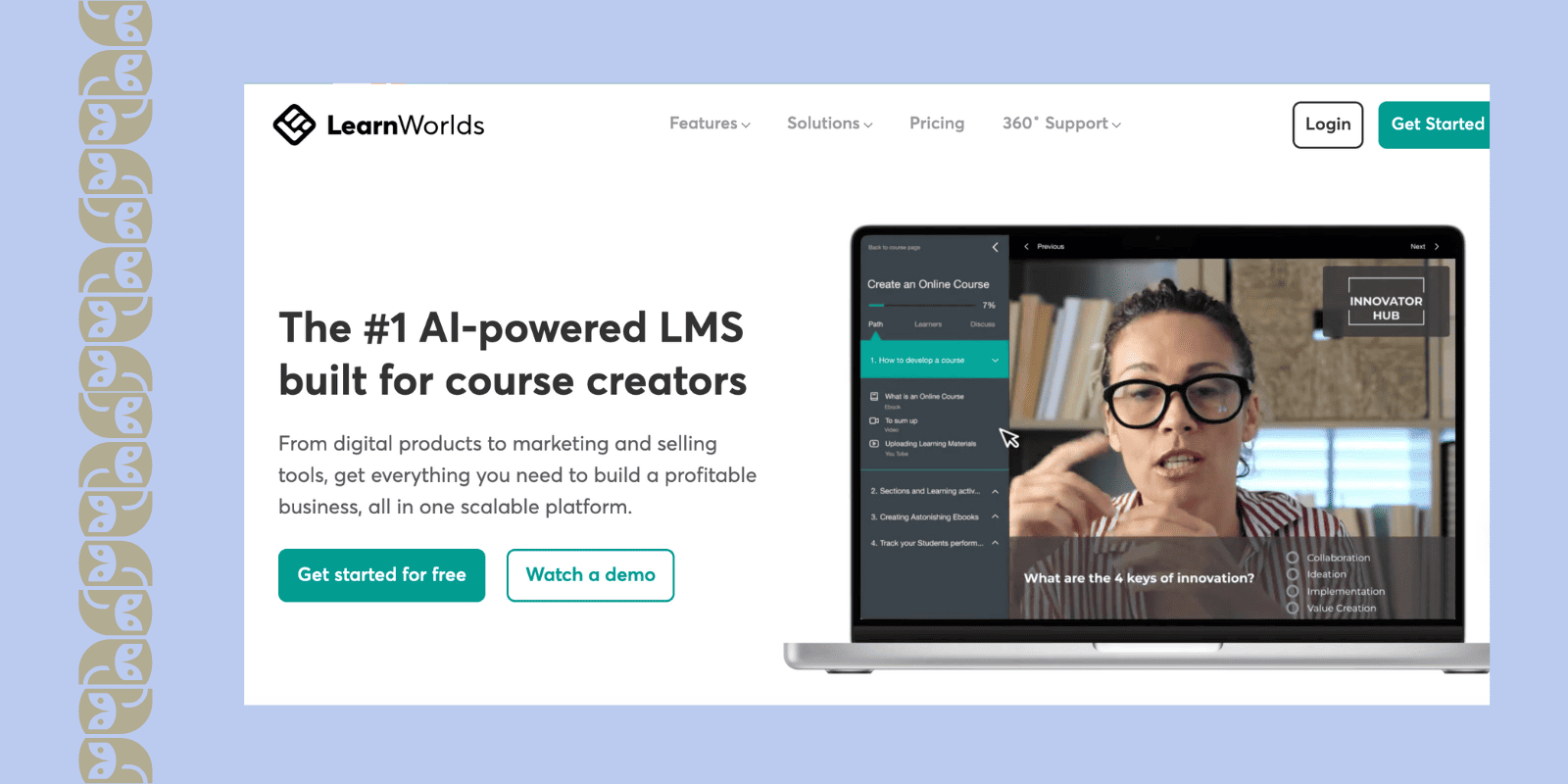
Are there SaaS LMS providers with e-commerce options for businesses and creators? Sure!
LearnWorlds is a comprehensive SaaS LMS for learning businesses and course creators with a diverse range of content formats, interactive videos, and e-commerce options.
Notably, LearnWorlds is a powerful solution for creators who focus on content production and prefer self-paced learning programs. Other than that, it provides basic discussion features and allows issuing certificates to the learners.
Key features of this SaaS LMS:
- Interactive videos. You can add text, polls, and images to videos, making learning more engaging and dynamic.
- SCORM support: This cloud LMS allows the inclusion of SCORM-compliant content, ensuring compatibility with industry standards.
- Mobile app builder. With LearnWorlds, you can create a custom mobile app to deliver online courses, providing learners with easy access on the go.
- Marketing tools. The platform includes page and pop-up builders, affiliate programs, and subscription models to boost course sales.
For whom is it a great pick?
For course creators and learning businesses focused on self-paced learning and requiring strong marketing support.
Pros: supports a wide variety of content formats; marketing and sales tools.
Cons: the interface can feel heavy and outdated; basic email marketing tools.
Pricing: Free trial; Starter Plan costs $29/mo.
Read more: Top Cloud Based LMSs
#4. LearnUpon: Solid LMS with Customizable Portals
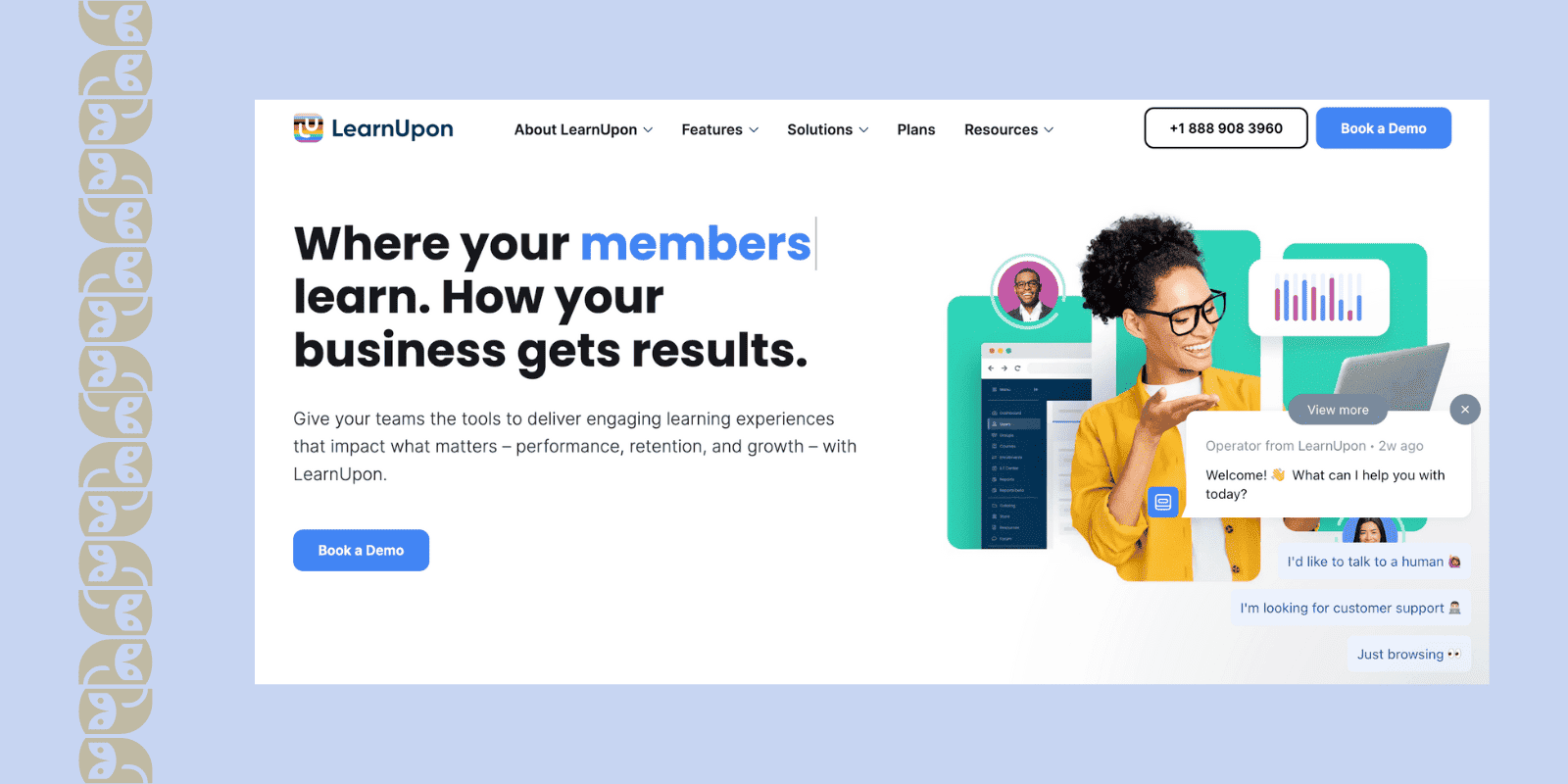
What are other intuitive SaaS LMS platforms?
LearnUpon is one of them, focusing on personalized learning through customizable portals and excellent format variety.
Importantly, it is pretty versatile and offers great user management and automation capabilities. Besides, it offers customizable portals that allow you to create tailored training experiences for different departments and groups. Other than that, it provides decent gamification and integrations.
Key features of this SaaS learning management system:
- Custom learning portals. With LearnUpon, you can create sub-portals that support white-label options and customizable learning paths.
- Content creation tools. Other than that, LearnUpon offers a flexible course editor, supporting video, xAPI, and SCORM formats, alongside instructor-led sessions and linked resources for comprehensive training.
- Engagement suite. The software allows users to use gamification elements like badges and leaderboards, comment sections, and an app for better user engagement.
- Automation & integration. Lastly, there are strong automation features and seamless integration seamlessly with HR software that enhance administration and scaling.
For whom is it a great pick?
For customized training, blended learning, compliance training, and separate group training courses across multiple departments.
Pros: easy-to-use approach with intuitive navigation; excellent automation and integration capabilities.
Cons: course authoring options are somewhat basic; limited editing capabilities after course publication.
Pricing: available upon request after contact with sales.
#5. Docebo LMS: All-in-One SaaS Training Platform
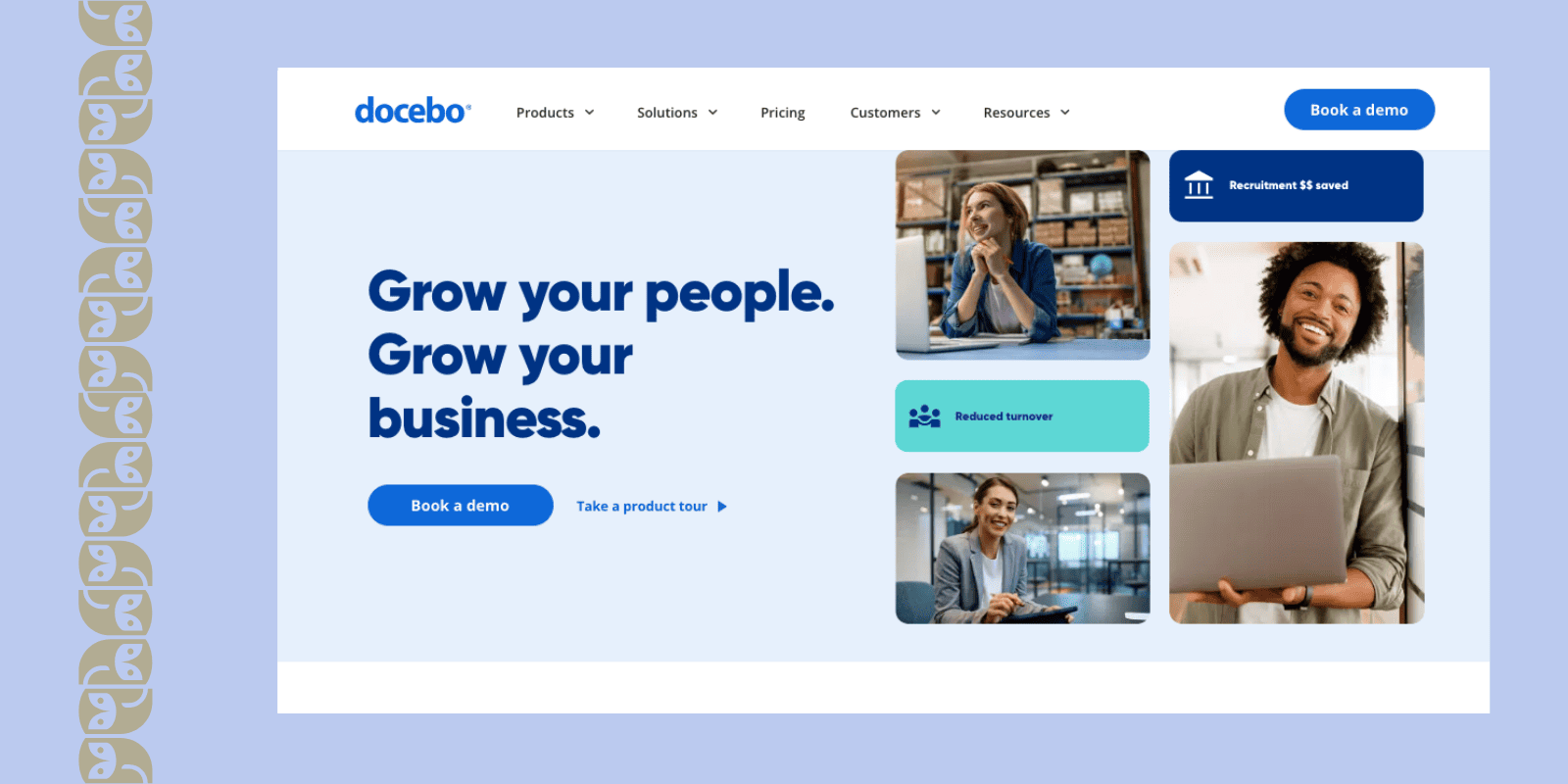
If you are looking for a solid SaaS LMS for upskilling, the next platform can be the best choice for you.
Docebo LMS represents a comprehensive SaaS training platform for skill development, bringing AI-driven tools, extensive automation features, and a content library or marketplace.
That way, it allows large companies to create personalized training plans, create immersive training, and recommend content. AI-backed course management significantly helps with operational load, while gamification options add to engagement. Moreover, its learning analytics tools are decent, allowing data-driven solutions.
Key features of the SaaS LMS:
- AI and automation tools. For instance, there is a Docebo Skills Feature that supports personalized learning paths, while Docebo Shape allows converting external resources into training content.
- Content marketplace. Docebo grants access to a wide range of courses, training materials, and summaries to support different learning and corporate needs.
- Gamification. Also, it features badges, certifications, leaderboards, and points to motivate and engage learners.
- Analytics. Lastly, Docebo has a strong focus on analytics, offering dashboards and reports to track skill development, course completion rates, and other key metrics.
For whom is it a great pick?
For the learning and development industry and corporate actors looking to build extensive programs for skill gap closure, upskilling, and continuous workplace learning.
Pros: comprehensive platform with robust AI and automation features; extensive content marketplace and gamification tools.
Cons: limited custom reporting capabilities; expensive, especially for smaller organizations.
Pricing: starts at $25,000/year (based on a 3-year contract).
#6. TalentLMS: SaaS LMS with Flexible Course Editor
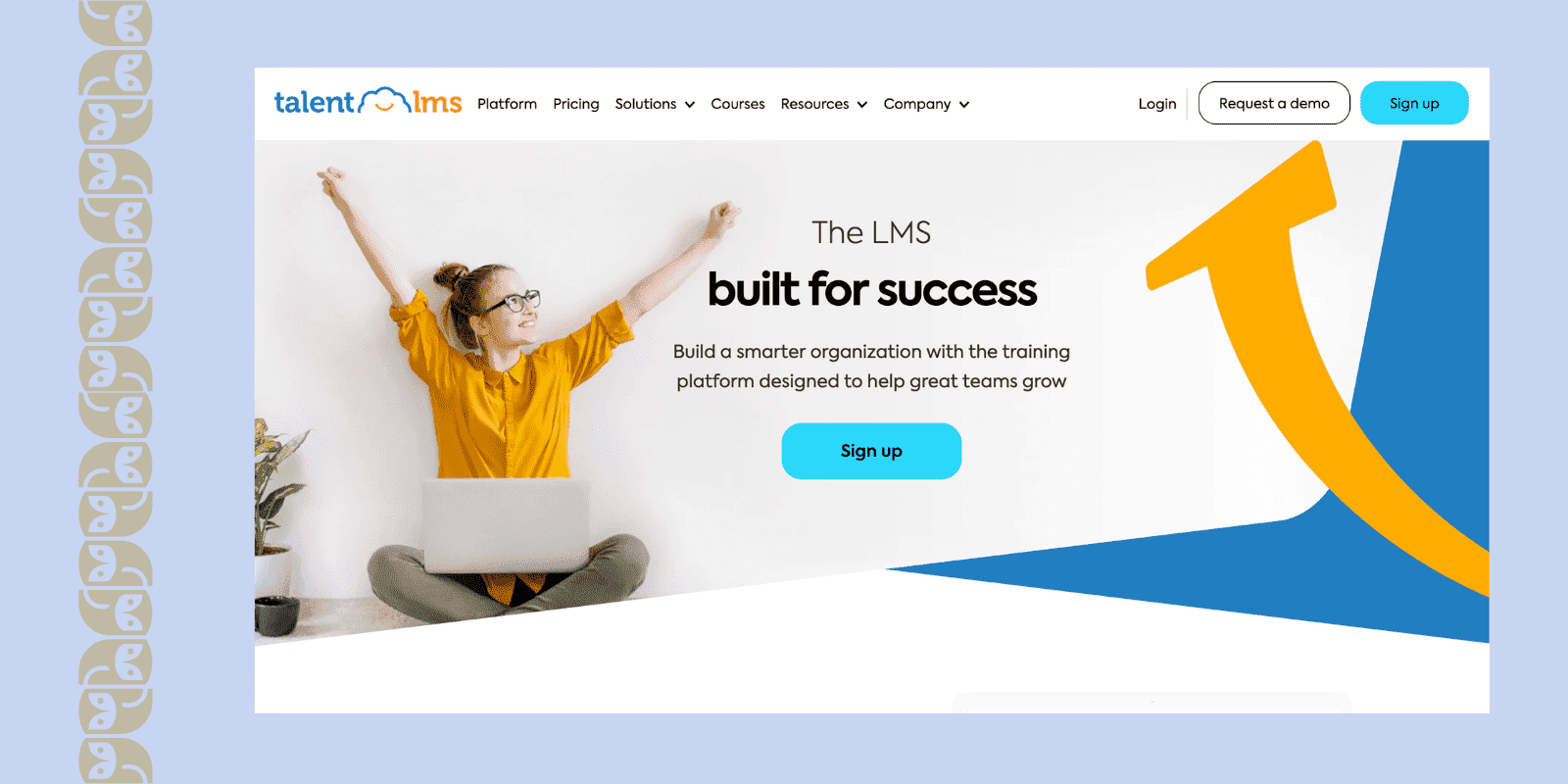
Lastly, there is another corporate training option.
TalentLMS is a versatile SaaS LMS suitable for content-rich training programs because of its flexible course builder and excellent user management features.
Besides, this SaaS learning management system is pretty simple, offering quizzes and exams, customizable home pages, and great tools to administer learning. For instance, it offers auto-assigns, auto-reminders, and inactive user deactivation.
This SaaS LMS is especially great for scalable training programs across various departments because of its branch feature.
Key features of the SaaS LMS:
- Flexible course editor. The LMS vendor presents Talenlibrary with 1000+ courses and supports various media formats, including SCORM, xAPI, presentations, and videos, for rich content creation.
- User management. The distinctive element is the branches' feature to create sub-accounts with unique branding and content for different departments.
- Gamification. This platform offers great tools for gamification that include badges, levels, and rewards.
- Mobile app. Provides on-the-go learning with a dedicated mobile app, ensuring accessibility and convenience for learners.
For whom is it a great pick?
For mid-sized and large businesses seeking scalable and gamified training programs to upskill employees or handle customer training.
Pros: easy to use and manage with diverse content options; strong gamification and mobile learning support.
Cons: limited social learning tools; restricted API capabilities.
Pricing: starts at $89/month.
#7. Skilljar: SaaS LMS Platform for Customer Education
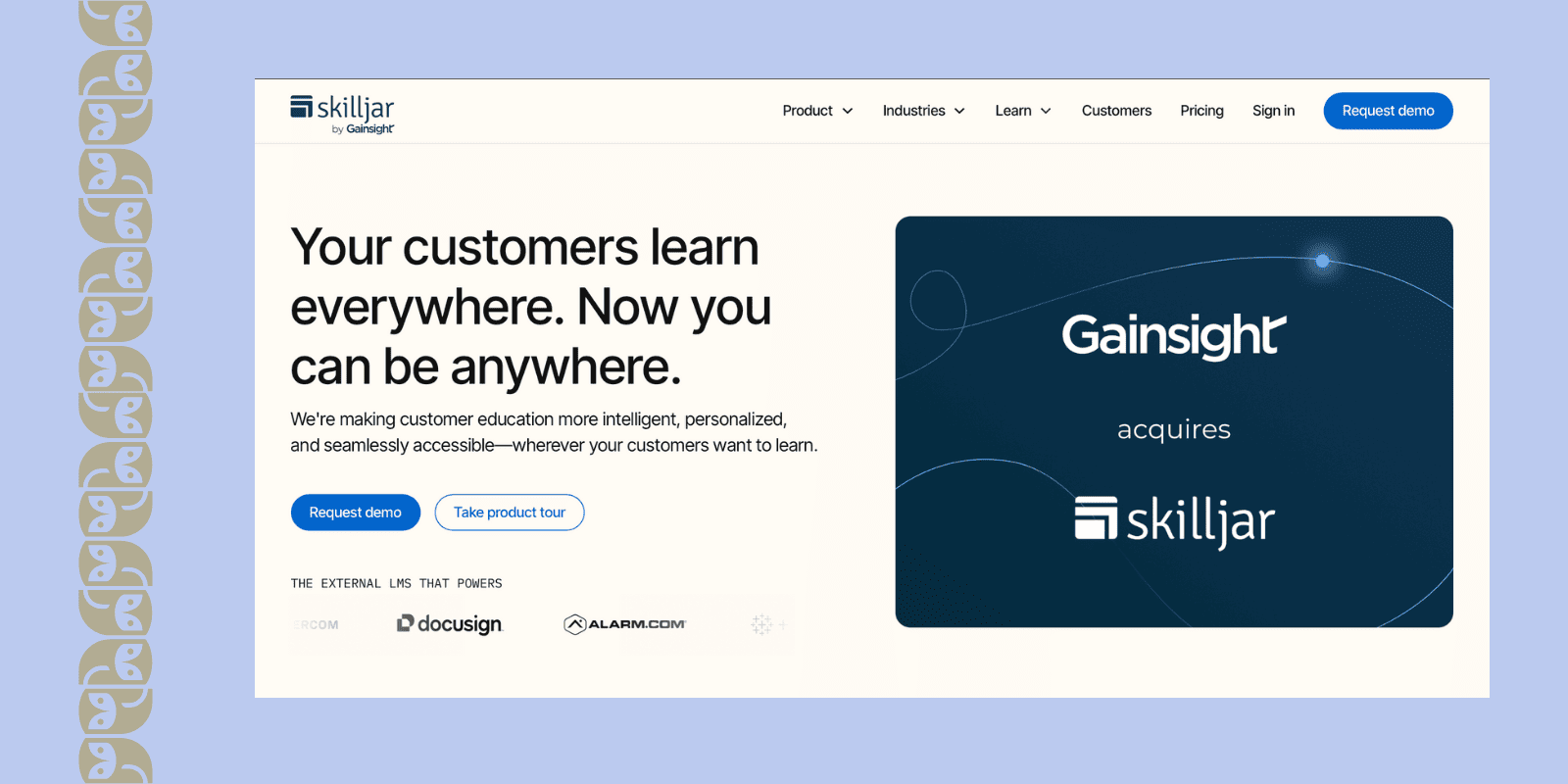
If you are looking for a SaaS learning management system for customer and partner education, Skilljar seems like a decent option.
Skilljar is a SaaS LMS that helps training businesses and companies to build branded training academies and portals.
There’s a great emphasis on ease of use, flexibility, and structure. With it, training companies can build organized learning experiences, handle various partner programs, and automate training operations.
Notably, organizations can streamline onboarding and product training, while for training agencies and coaches, there are monetization options. Considering SaaS LMS integrations, it connects to essential business tools so you can scale your training programs effectively.
Important features of this SaaS LMS
- Customizable spaces. Skilljar is customizable and allows you to create a branded training environment that reflects the company's identity.
- Content delivery. With options for on-demand and instructor-led training, Skilljar can help create diverse programs and support them with certifications.
- Comprehensive analytics. Concerning learner analytics, Skilljar provides in-depth insights into learner progress and course effectiveness and connects with Salesforce.
For whom is it a good choice?
For training agencies and corporate acrots aiming to enhance customer onboarding, improve product adoption, and deliver effective partner training.
Pros: user-friendly, great integrations with business tools, responsive supports.
Cons: content editor and reporting tools are not advanced, lack of features for management.
Pricing: available upon request
#8. Cypher Learning: SaaS LMS for Organizations to Upskill Employees
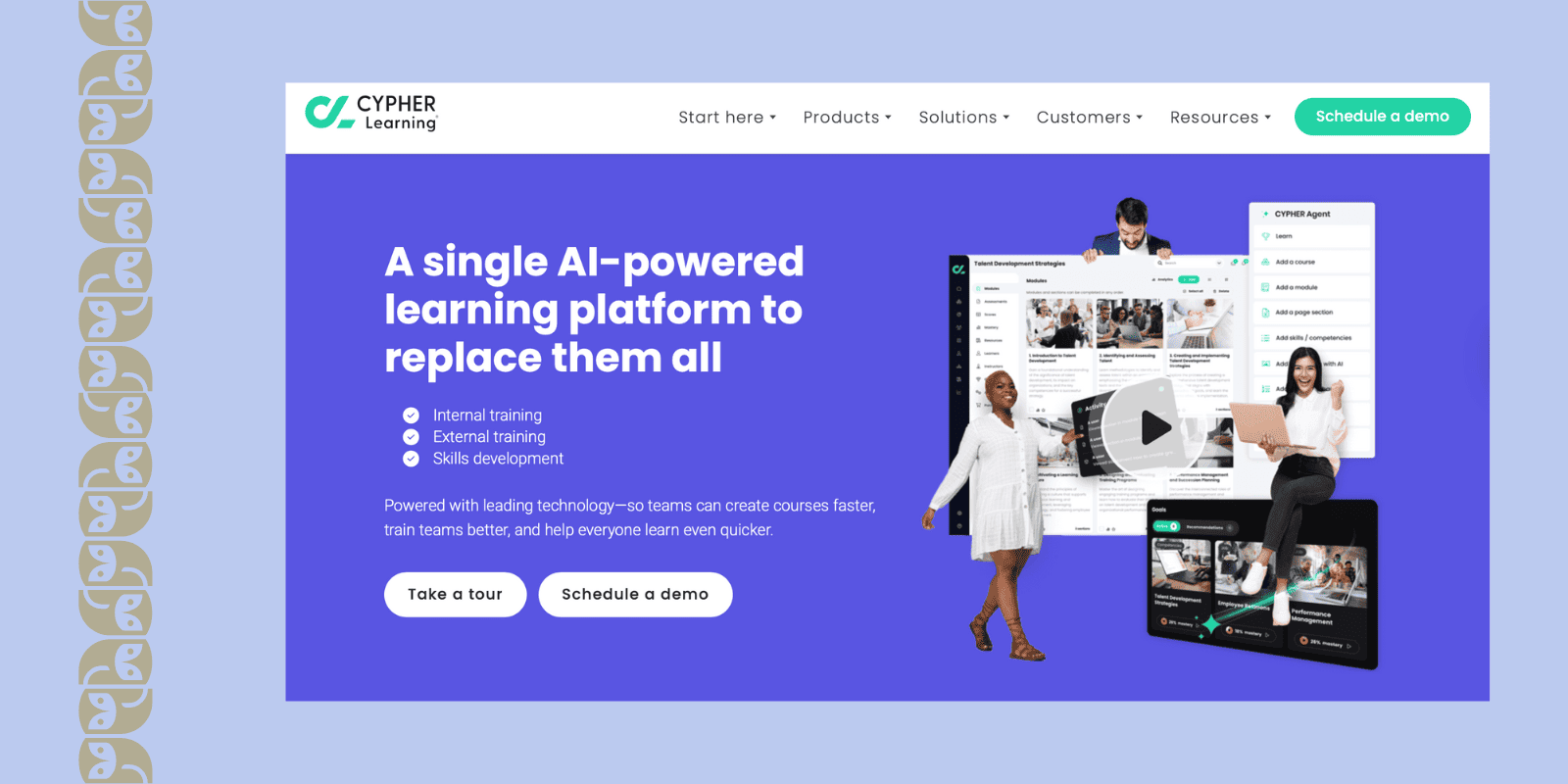
Next, let’s switch to another innovative yet comprehensive SaaS learning management system.
Cypher Learning is a SaaS learning platform combining LMS, LXP, and course development, automating course creation, bringing personalization opportunities, and streamlining workflows.
This SaaS LMS provides powerful third-party content services and AI capabilities to optimize content development and offer skill recommendations. Moreover, it has decent automation tools, muti-language support (over 50 languages), and in-built reporting tools.
That way, it is a complete SaaS learning management system with a powerful tool to optimize operations.
Key features of this SaaS LMS platform:
- AI-powered capabilities. One of the key benefits of this LMS is the Cypher Learning AI 360 feature, which helps with course creation and skill development. It is possible thanks to the access to pre-made skills, skill mapping algorithm, assessment, and game options.
- Personalized learning paths. Cypher Learning allows you to customize experience, ensuring adaptive learning and providing content that is tailored to the learners’ needs.
- Gamification and social learning. Other than badges, games, and activity indicators, Cypher Learning provides a wide variety of social learning tools (group forums, chats, wikis, web conferencing tools).
For whom is it a good choice?
For corporate actors and enterprises to handle employee upskilling and product training.
Pros: fast course development with AI tools and content providers, powerful engagement kit, skill mapping, multi-language capabilities, decent analytics.
Cons: high cost for small businesses, integration limitations, limited customization, learning curve.
Pricing: upon the contact with Cypher Learning Team
#9. Canvas LMS: Flexible SaaS LMS for Educational Organizations
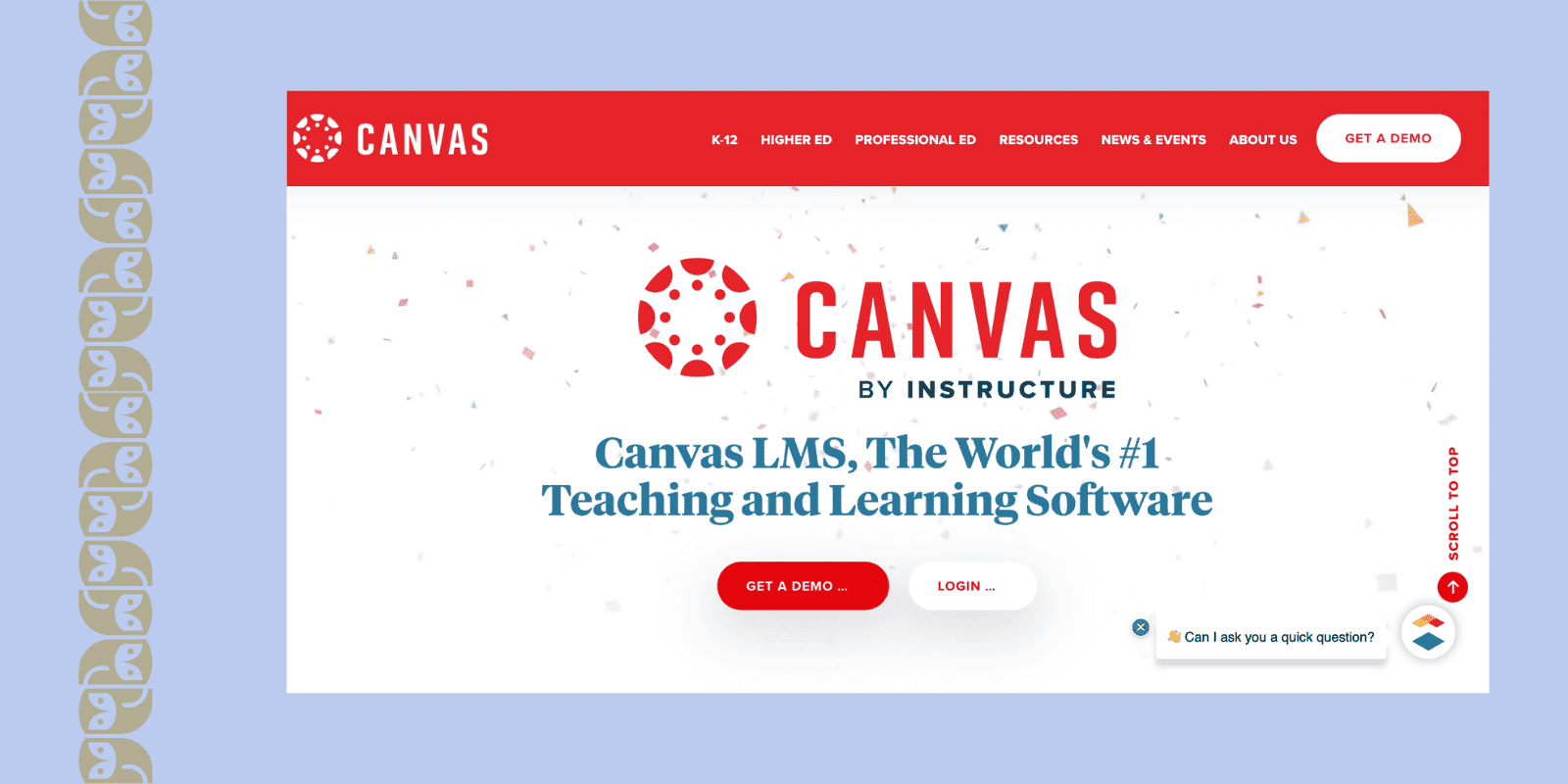
Nope, we haven’t forgotten about SaaS LMS for educational businesses and academies. There’s Canvas LMS.
Canvas LMS is a popular SaaS LMS that is open-source, meaning it offers great content variety and powerful customization capabilities.
Unlike other SaaS LMS platforms, Canva is known for its powerful integrations and plugins, mobile accessibility, and interactive engagement tools. Other than that, it has in-built tools for real-time collaboration and customization of course structures. Also, Canvas has advanced options for grading, assessments, and quizzes.
Key Features of this SaaS LMS:
- Collaborative tools. It offers a variety of tools to engage with learners, including discussions, messaging, and video-based communication.
- Integrations and plugins. With this SaaS LMS, you can connect with hundreds of tools, from Adobe and Google Classroom to Microsoft Teams and Zoom.
- SpeedGrader and analytics. CanvasLMS automates grading and allows you to gain actionable insights into learners' performance.
For whom is it a great choice?
Canvas is ideal for higher education institutions, business academies, and universities.
Pros: high customization, strong engagement tools, advanced grading, assessment, and analytics.
Cons: not as intuitive as other options, can be complex, overreliance on plugins.
Pricing: provides free basic version for teachers and students; other Canvas LMS pricing options are available upon demo request.
#10. SanaLabs: SaaS LMS with Advanced AI Capabilities

Fond of a SaaS learning management system with powerful optimization and an AI engine? You should check SanaLabs.
Sana Labs is an innovative AI-driven SaaS LMS offering advanced agents and automation tools to simplify content creation, personalize learning, and provide instant analytics.
Contrary to traditional solutions, SanaLabs offers an approach that puts AI in the center. That way, it is extremely effective in automating course creation training operations and developing learning experiences.
In particular, it is possible due to automated workflows and AI agents. They allow you to easily build interactive courses from static files, collaborate during content and program creation, and create adaptive learning paths.
Key features of this SaaS learning management system
- AI-powered course creation. Thanks to the specific agents, you can generate courses from PDFs, enhance them with AI voice narration, and translate them into other languages with several clicks.
- Automated administration. Reduce manual work with AI-driven user enrollment, training reminders, and skill tracking.
- Reporting and analytics. Via this SaaS LMS, you can create custom dashboards and feedback loops, and get real-time insights on training effectiveness.
For whom is it a good choice?
Corporate L&D teams and enterprises with a need to streamline training operations and scale.
Pros: AI-driven automation to reduce admin workload, real-time collaboration tools for content creation, Strong personalization,
Cons: high pricing, learning curve for advanced AI features; features are not as advanced compared to others.
Pricing: starts at $3900 ($13 per license with a minimum of 300 licenses)
Summary: Which SaaS-Based LMS to Choose?
In the end, each platform discussed in this article offers distinct advantages, making it suitable for different types of users and training scenarios. Yet, if group them by key features, you can outline the following SaaS learning management systems:
- If ease of use and a streamlined user experience are your top priorities, EducateMe is perfect for the creation of a collaborative, scalable, and user-friendly learning environment. LearnUpon equally intuitive, providing customizable learning portals to offer employee training across different departments.
- When it comes to flexibility, TalentLMS and LearnWorlds are decent options. TalentLMS is great for for scalable training programs in mid-sized and large businesses, while LearnWorlds, is perfect for course creators focused on self-paced learning.
- For organizations seeking a comprehensive set of features, Docebo LMS, Cypher Learning, and Absorb LMS lead the way. Each ofthem is feature-rich, offering gamification, AI recommendations, and excellent management options.
- For educational organizations and academies, Canvas LMS is the best option, due to the price, plugins and grading tools.
- For advanced automation and AI agents, Sana Labs may be the right tool, having outstanding AI capabilities.
Still in doubt? Check what EducateMe has to offer!























